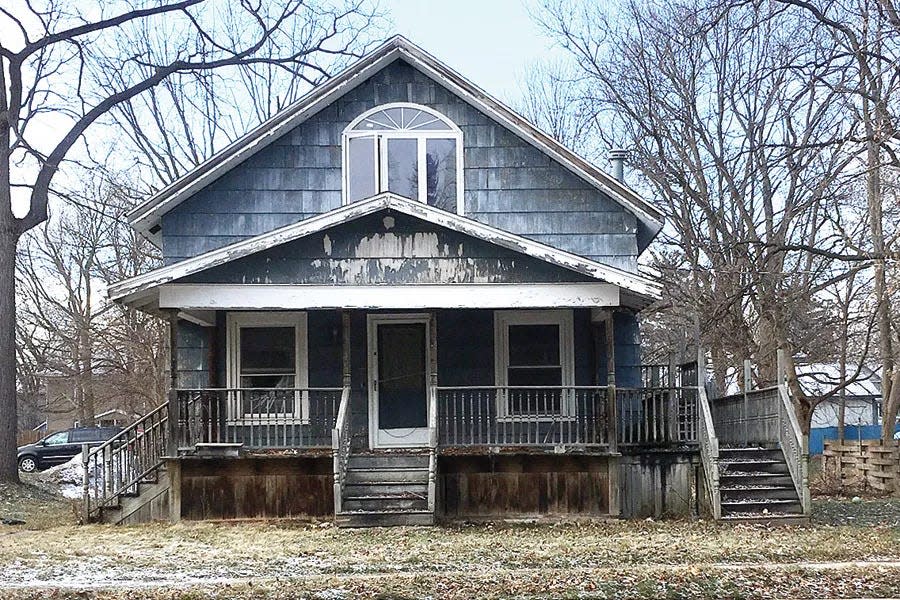Seeking to address 'aging housing stock,' Adrian applies for $475,000 in grant assistance
ADRIAN — To address what it calls an “aging housing stock,” the Adrian City Commission on Monday approved an application to the Michigan State Housing Development Authority for a housing rehabilitation grant and a public amenity grant.
In total between the two grants, Adrian requested $475,000 in funding from the MSHDA MI Neighborhood program, which opened its first round of funding on April 1. The application window for available funds closes in about two weeks, Adrian City Administrator Greg Elliott informed the city commission at Monday’s meeting.
Discussion about the grant application took place during the commission’s premeeting work study session, led by Elliott and Jay Marks, Adrian’s Main Street director. The commission acted on the application during its regular meeting, approving the submission of the application to MSHDA. Commissioner Mary Roberts was absent from the premeeting and the regular meeting.
Adrian and Lenawee County are within Region K of MSHDA’s Neighborhood Housing Initiatives Division, which also includes Hillsdale, Jackson, Livingston, Monroe and Washtenaw counties. The total amount of grant funds available for this region is $8,824,000, and the funds are expected to go quickly, Marks said.
A new round of funding will come out Oct. 1, Marks said, starting at $60 million statewide, which would be another $8.8 million available for Adrian’s region.
“There are some significant improvements we can apply toward our community pretty quickly,” Marks said.
Here is an overview of each grant pursued by the city:
Rehabilitation grant
Successful proposals for MSHDA’s housing rehabilitation grant will target resources to the needs of the specific community and demonstrate the appropriate size and scope of the activity. Rehab activities covered under this grant range from smaller projects to energy efficiency and from accessibility improvements to substantial rehabilitation.
Data that demonstrates the target community’s need for housing rehabilitation will be considered during the evaluation of applications, MSHDA said in its program overview. Communities with a high percentage of housing built before 1970 and high rates of families that are burdened with housing costs will be given preference.
Adrian, as part of its grant request, is seeking $400,000 in funding for the rehabilitation of housing in the city.

The maximum subsidy per unit may not exceed $40,000 for occupied units and may not exceed $100,000 for unoccupied units, MSHDA said. A five-year lien for the full amount of the assistance will be placed on properties that receive more than $10,000. After five years, that lien is forgiven. If the house is sold before the five years is up the owner must repay MSHDA that money, Marks said.
The rehabilitation grant can be for single or multifamily housing, but the city is honing its focus on single-family housing with limited means, Marks told the commission during the premeeting.
“The guidelines that we want to use for the program would be those that you (the city commission) set forth for the revolving loan fund,” Marks said. “...That would allow us to really focus on that same group.”
Last year, Adrian initiated a blight repair loan fund — also called a revolving loan fund — to assist Adrian homeowners who have been flagged with blight issues by paying for the cost of those repairs if homeowners meet certain financial eligibility criteria. The city set up the loan fund with initial funding of $250,000.
According to MSHDA’s guidelines, there is no requirement for homeowners to be in violation of a municipality’s blight or code enforcement laws to ask for assistance. That is, however, a requirement of Adrian’s revolving loan fund.
“Anything that we do beyond what they (MSHDA) provide us is strictly up to us,” Marks said. “It’s the fact that we have a plan in place that allows to execute more quickly than other municipalities.”
Rehab programs available through MSHDA’s grant include energy efficiency, an activity that prioritizes increased energy efficiency and reduces utility costs; accessibility improvements, which prioritizes accessibility improvements to reduce barriers for occupants; minor home repairs that prioritize minor health and safety issues for occupants; exterior rehabilitation; substantial rehabilitation of a property; and rental redevelopments. Units must have been vacant as of Dec. 31, 2023.
Public amenity grant
The primary goal of this component is to identify and fund innovative activities to address community or neighborhood needs, MSHDA said. Public amenities are intended to provide public benefits to health, safety or overall quality of life within a community.
To apply for funding from this grant, requests must be for enhancements located within a downtown or in an adjacent area to a downtown.
Adrian is asking for $75,000 in funds which will be used for the revitalization of the Maiden Lane area. There is a one-to-one match required for the public amenities program, and the city has the funds to execute that match, Marks said.
Subscribe Now: For all the latest local developments, breaking news, and high school and college sports content.
Eligible activities, according to MSHDA, include playground structures or amenities, walking paths, murals, pocket parks, pavilions, permanent benches, entranceway signs and lighting, orchards or perennials, dog parks, community spaces or raised garden beds, gazebos and picnic tables.
“This program encourages enhancements and/or creation of public amenities that promote outdoor activities and events,” MSHDA said.
— Contact reporter Brad Heineman at bheineman@lenconnect.com or follow him on X, formerly Twitter: twitter.com/LenaweeHeineman.
This article originally appeared on The Daily Telegram: Adrian applies for Michigan State Housing Development Authority grants

